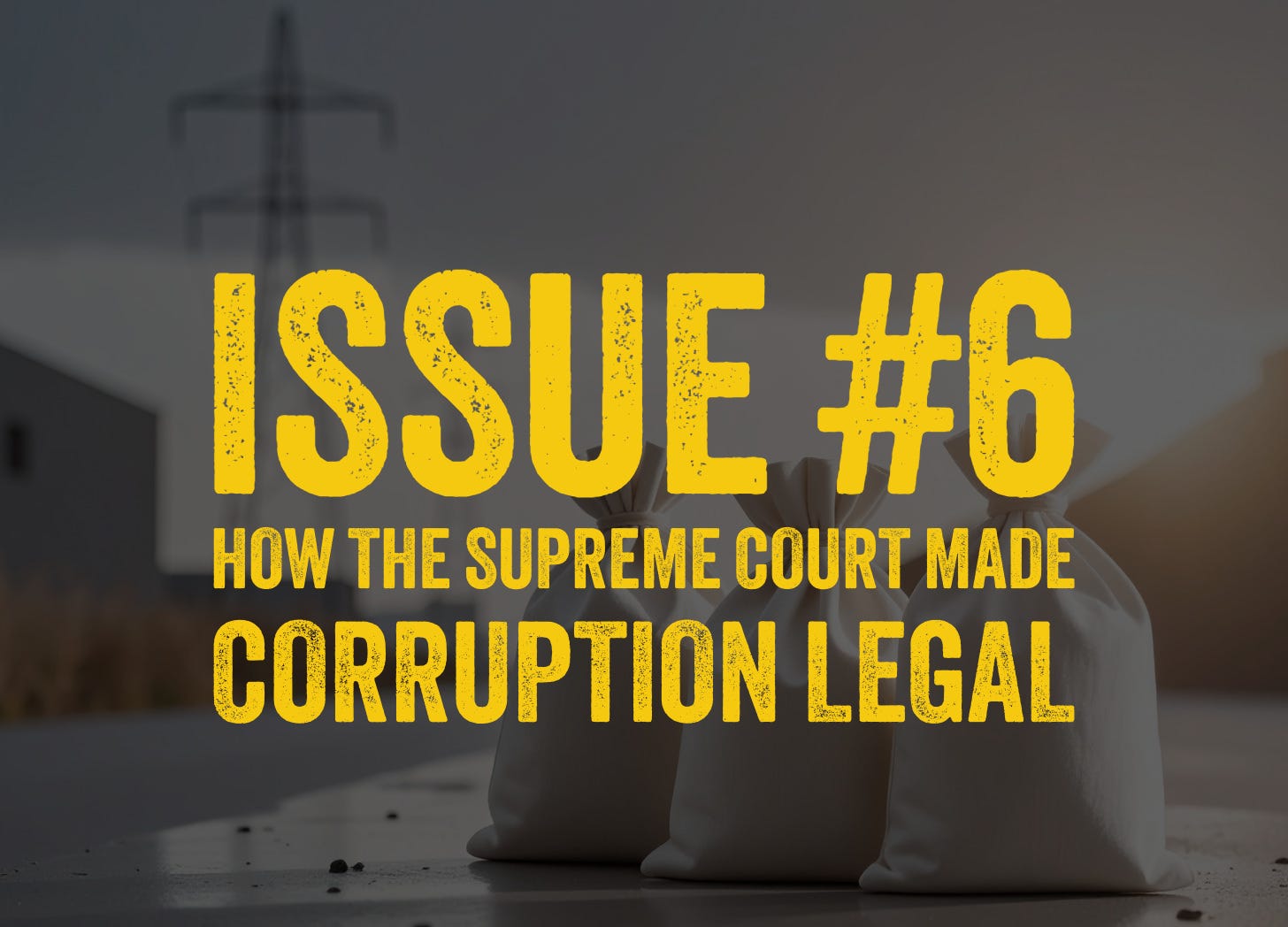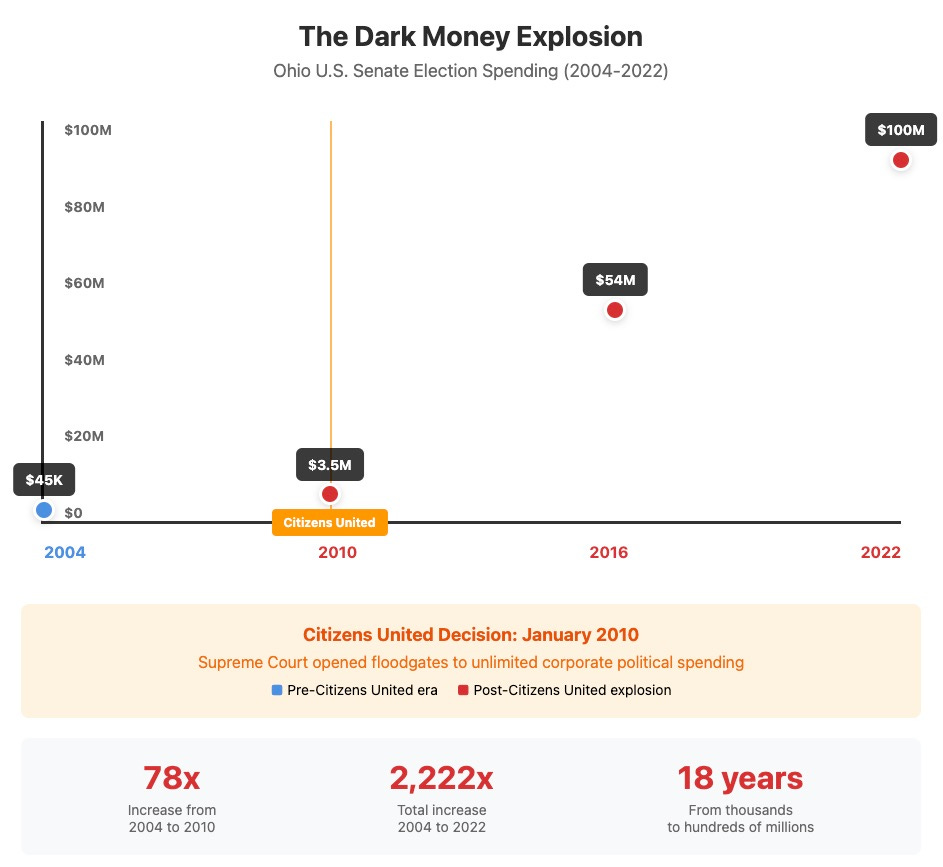"Power Corrupts: Cleaning Up America's Biggest Industry" was published two weeks ago and is now available nationwide at bookstores and online! Get the complete investigation that reveals the full scope of utility corruption across America. If this newsletter series has opened your eyes to utility corruption, please share it with friends, colleagues, or anyone who pays an electric bill.
Introduction
How did utility corruption become so easy to get away with? After witnessing FBI raids, death threats, and intimidation campaigns, you might wonder why more executives aren't behind bars. The answer lies in a series of Supreme Court decisions that opened the floodgates to dark money and made political corruption nearly impossible to prosecute.
How do we curb power corruption? One key is transparency.
Let's begin by shining a light on dark money. The Supreme Court's Citizens United decision, obviously, impacts more than electric utilities, yet the power industry's abuses should serve as leverage to reform our political-contribution rules in ways that end unlimited and untraceable spending.
Anti-corruption prosecutors in several states focus their wrath on dark money groups, claiming utility scandals would not have happened without them. Said one government lawyer: "The millions paid (by dark-money groups)...are akin to bags of cash---unlike Political Action Committee contributions, they were not regulated, not reported, not subject to public scrutiny---and the [Householder] Enterprise freely spent the bribe payments to further the Enterprise's political interests and to enrich themselves." A former federal prosecutor called these secretive organizations "the perfect money-laundering tool." And Neil Clark brashly declared: "Let's call it what it is---pay to play;" the former Ohio lobbyist fretted that big monopolies already awash with guaranteed profits, such as electric utilities, increasingly use much-larger undisclosed payments to control regulatory and legislative debates.
Reform Possibilities
Since the current Supreme Court is unlikely to outright overturn its pro-corporation decisions, one reform would be to distinguish utilities, which are government-sanctioned monopolies, when it comes to reporting and limiting secret spending. That argument reflects the suggestion by former justice Anthony Scalia -- considered the intellectual anchor of the court's conservative wing -- that state-granted monopolies (such as electric utilities) should be treated differently and face stricter requirements than other corporations under campaign finance laws. Another adjustment would be for state and federal regulators, who swear to oversee power-corporation finances, to require the regular disclosure of all utility political payments.
Most politicians, moreover, probably are hesitant to give up dark-money payments, but reforms would be popular since 90 percent of Americans complain about Big Money's influence in politics, and more than three quarters favor a constitutional amendment to overturn Citizens United. The public also would support Congress demanding stronger disclosure and trace-back requirements, empowering the Federal Elections Commission to confront dark-money's illegal coordination with campaigns, and establishing the right of voters to know who is spending money to influence their vote.
Kennedy's Broken Promise
Anthony Kennedy, the retired Supreme Court associate justice who authored the majority 5-4 opinion in that Citizens United 2010 case, assumed unrestrained political payments would still be disclosed, allowing voters to determine who funded which candidates. In delivering the court's opinion, Kennedy wrote that the public should "see whether elected officials are 'in the pocket' of so-called moneyed interests." As evidenced by utility scandals across the country, neither legislators nor regulators implemented the justice's call for transparency, and Kennedy later admitted that "disclosure is not working the way it should."
Power-corporation bribery makes other parts of Kennedy's opinion also seem naïve. He argued "that independent expenditures, including those made by corporations, do not give rise to corruption or the appearance of corruption. ... The fact that (donors) may have influence over or access to elected officials does not mean that these officials are corrupt. ... The appearance of influence or access, furthermore, will not cause the electorate to lose faith in our democracy."
The four justices in the minority disagreed and insightfully warned of probable corruption by politically active corporations, unions, and other well-heeled organizations. John Paul Stevens wrote that the majority decision represented "a rejection of the common sense of the American people, who have recognized a need to prevent corporations from undermining self-government." A brief by the then solicitor general, now Supreme Court Justice Elena Kagan, predicted a "pay-to-play" government that conforms to the wishes of deep-pocketed individuals and corporations able "to afford the ante."
The Flood of Money
A subsequent analysis by Public Citizen found that the Supreme Court's campaign-finance rulings "unleashed torrents of outside spending by unregulated groups ... and led to a massive increase in anonymous political spending." Election-related payments associated with just Ohio races for the United States Senate soared from $45,000 in 2004, to $3.5 million in 2010, to more than $54 million in 2016, to almost $100 million in 2022.
Making Corruption Legal
Most reporting on Citizens United has focused on how the Supreme Court revolutionized campaign financing, allowing one dollar to equal one vote and equating corporations with people and money with speech. Yet the justices did much more in other decisions to enable fraud. The court, for instance, restricted political corruption to "quid pro quo" activities and the "direct exchange of an official act for money." Such limitations to the most extreme form of bribery make it harder to prosecute subornation. The chief justice further blocked anti-corruption efforts by writing that spending to "garner influence over or access to elected officials or political parties" wasn't necessarily graft but rather was a needed exercise of First Amendment rights. The dance of "ingratiation and access ... are not corruption," he declared, but are "a central feature of democracy."
Corruption Goes Mainstream
A few years after issuing such opinions, the Supreme Court went even further, overturning a variety of bribery convictions, including former Virginia Governor Bob McDonnell and his wife who accepted tens of thousands of dollars from a Richmond executive trying to have the state help promote a tobacco-based dietary supplement. The justices also threw out corruption verdicts against two allies of New York Governor Andrew Cuomo in relation to a graft-plagued economic development effort in Buffalo. Donald Trump, in his first term, took up the leniency banner by pardoning 13 public officials convicted of corruption, and he vastly expanded clemency in his second term. Trump also ordered a pause in Federal Corrupt Practices Act (FCPA), making it harder to prosecute executives and politicians for making false statements. And in June 2024, the Supreme Court again weakened federal anti-corruption laws when conservative justices sided with the former mayor of Portage, Indiana, who had been convicted of accepting $13,000 from a trucking company weeks after it received a $1.1-million city contract; the majority somehow argued the payment was a legal "gratuity" rather than an illegal "bribe."
The Historical Context
Turning a blind eye to bribery is a relatively new phenomenon. Throughout most of the 20th century, observed one lawyer, "lawmakers criminalized the everyday palm-greasing and back-scratching of an earlier era, outlawing improper gratuities, conflicts of interest, extortion, and racketeering; they created robust campaign-finance laws, independent regulatory commissions, and comprehensive civil-service systems."
The Results
Large bipartisan majorities abhor the results of the Supreme Court's recent deregulation of money and lobbying in politics. A 2023 survey found that the second most common word describing American policymaking was "corrupt." In the twenty-five years since the Roberts court opened the political-contribution floodgates and restricted corruption cases, trust in government fell by a third, reaching a dismal 16 percent. According to one legal analyst, "The court's decisions have increased the time and complexity of corruption investigations and bred caution and uncertainty among prosecutors, who worry that even in cases that seem clear-cut, a conviction is no longer guaranteed to survive judicial scrutiny."
State Pushback
A few states responded to power scandals by pushing back on the high court's political deregulation. Illinois, as noted above, approved the Climate and Equitable Jobs Act that creates an independent ethics committee. Arizonians in November 2022 approved a ballot measure, with over 70 percent approval, requiring public disclosure of big-dollar donors to dark-money political groups trying to influence state, local, and ballot-issue campaigns.
Much more, however, is needed to curb corruption and restore trust in our business and political systems.
Why This Matters to You
The Supreme Court decisions enabling utility corruption directly affect your community's energy costs and options. When utilities can spend unlimited dark money on elections without disclosure, they capture the regulators who set your rates and the legislators who determine energy policy. This system blocks competitive markets that would lower your bills and clean energy projects that would create local jobs. The court's narrow definition of corruption means utilities can buy "access and influence" legally, leaving you with higher costs for dirtier energy. Until transparency requirements force utilities to disclose their political spending, your community will keep paying inflated rates to fund their lobbying campaigns and bailout schemes.
Next Week
Beyond dark money reforms, what other measures can stop utility corruption? Next week's final newsletter: comprehensive reforms to restore competitive markets, protect citizens who fight back, and ensure that innovation—not bribery—determines America's energy future.



